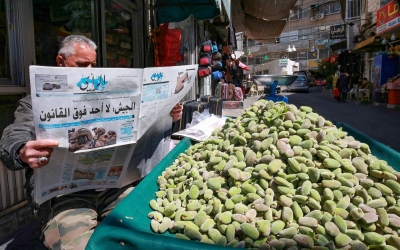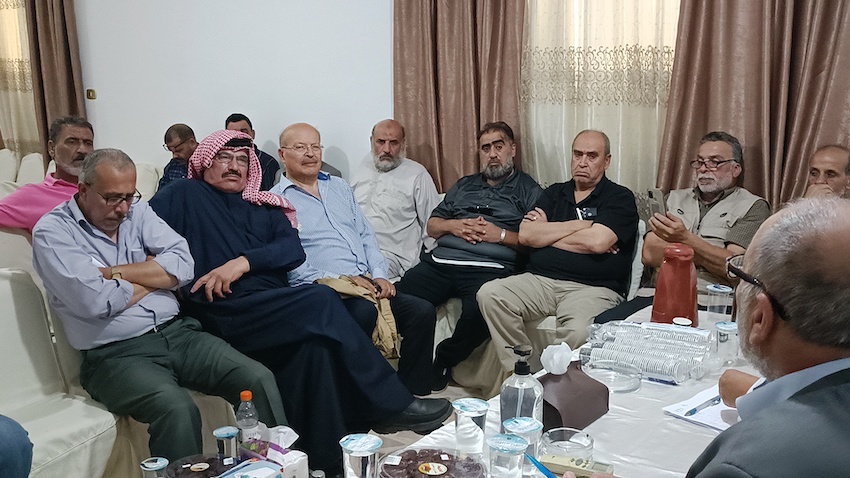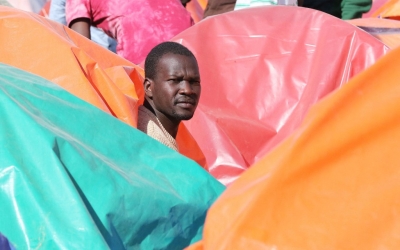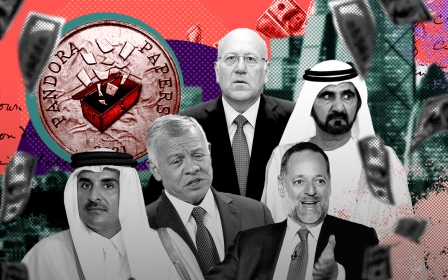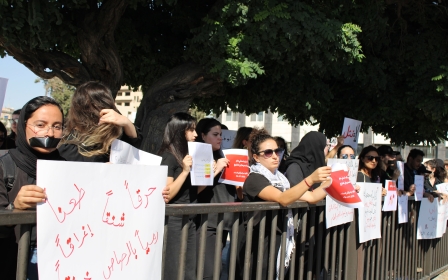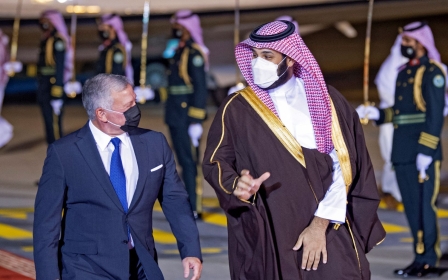Jordan's tribal leaders take aim at King Abdullah II
Mohammed Khalaf Hadid was quiet. The sheikh of a Jordanian tribe and head of the National Committee for the Defence of Political Prisoners, he was leading a meeting in the basement of the lawyer Musa Abdallat’s home in Amman on Friday night.
Families of Jordanian political prisoners - more than 20 people in total - were gathered around a table, sat on sofas and chairs, packets of dates and boxes of water in front of them.
Some of them were fasting, waiting to break their fast when the meeting ended after two-and a half hours at 8pm. All of them were angry.
New MEE newsletter: Jerusalem Dispatch
Sign up to get the latest insights and analysis on Israel-Palestine, alongside Turkey Unpacked and other MEE newsletters
'We live in poverty and hunger, crime is on the rise, and we do not get our right to work'
- Mohammed Khalaf Hadid, tribal leader
Relatives of imprisoned members of the Hirak movement, an opposition group founded in the wake of the Arab Spring to advocate democratic reform, their jailed loved ones are branded as terrorists by the authorities and accused of cybercrimes.
Hadid began to speak. He was also angry. Very, very angry.
Like the families present, Hadid wasn’t just calling for the release of the prisoners, he was aiming a broadside at the state of Jordanian society and the leadership of King Abdullah II.
As he spoke, he blamed the king for the arrest of the prisoners and castigated him for driving the Hashemite kingdom into a state of economic turmoil, while also stripping Jordanian citizens of their freedoms.
The sheikh began by denouncing what he called the excessive spending of the royal family on holidays and luxuries, all while ordinary Jordanians live in poverty.
“There are funds set aside for the royal family. How much do they spend daily? Is it one million a day for every member of the family spent on trips?” he asked.
“We have a right to know. We need to know how money is spent. This is our constitutional right to know the truth about what was published in the Pandora documents,” he said.
Last year, a massive leak of more than 11.9m confidential files revealed that between 2003 and 2017, the Jordanian king had amassed an international luxury property empire that includes 14 homes across the US and UK, from California to central London.
The revelations were met in Jordan by a media blackout that journalists in the country told Middle East Eye was far from coincidental.
Hadid went on. He hit the table in front of him more than once, blaming the king again and again and repeated, with bitter sarcasm, that this was all taking place “in the era of the renaissance, in the era of King Abdullah”.
“We live in poverty and hunger, crime is on the rise, and we do not get our right to work,” he said.
“There are many sons of officials who get jobs and are paid thousands of Jordanian dinars per month without any accountability. What they do is monitor political opponents, make their lives difficult, put pressure on their work, and prevent the right of assembly which is guaranteed by the constitution.
"Where is justice in the reign of the renaissance of King Abdullah II?”
Tribal support for the king collapsing
Historically, Jordan’s tribes have been some of the main supporters of the kingdom’s administration, but economic conditions coupled with the replacement of some of their leaders with “liberal” personalities have prompted a number of tribes to organise in opposition to the kingdom and its rulers.
At the meeting, leaders of a number of large tribes, including the Hweitat, Majali, Abadi, and Bani Hassan, were present. In February, 10 members of the Bani Hassan were arrested, prompting fury and rare public outrage directed at the king.
All the tribal leaders were angry, calling on King Abdullah II to start “genuine political and economic reform and to fight corruption”.
They demanded a return of public funds lost following a raft of privatisations, which the World Bank began assisting Jordan with in 1995.
Political, social and economic changes began to take shape in Jordan after King Abdullah II was inaugurated as king in 1999. Young and liberal, he made it clear that he intended to set up a civil state in the midst of a tribal society.
Jordanians, especially those from the tribes, saw their work in public sector jobs taken away from them following a series of privatisations - unemployment and poverty have spread as a result and services such as education, health and transportation have declined.
At the evening meeting in Amman, tribal leaders said the government’s promised fight against corruption had never materialised.
State use of torture
Musa Abdallat, a lawyer and the host of the meeting, demanded the freedom of political prisoners, the cancellation of the use of the National Security Court and the end of the use of torture against detainees.
Hadid backed Abdallat up, calling on Jordanian officials to compensate the victims of torture in Jordanian jails.
“Freedoms have retracted in the period of the reign of King Abdullah II,” he said. “There are cases of torture that took place in centres of interrogation and prisons. Those committing those cases of torture are not being held accountable.”
Abdallat called on the authorities to issue a special pardon that would encompass all political prisoners.
These were not arrests, but kidnappings. Their homes were attacked by masked men - we did not know who they were
- Jawad al Manaseer, activist
“Activists should not be turned over to the state security court based on vague charges such as supporting terrorism or causing problems to the relations with friendly countries and other similar accusations,” he said.
“Instead, Jordanian officials must do everything in their power to release Jordanian and Palestinian prisoners in Saudi jails. Jordan has become an authoritarian country using violence in contradiction of international standards of governance,” Abdallat said, adding that thousands of people are being treated in unmonitored state security courts to which the media has no access.
Families of detainees accused Jordanian security of using “beating and torture” against their loved ones.
A family member from the Hweitat and Bani Hassan tribe told in detail stories of the arrest of their politically active sons.
Jawad al Manaseer, one of those present, said: “These were not arrests, but kidnapping. Their homes were attacked by masked men - we did not know who they were.”
Manaseer told the story of Ali Demani Hweitat, an activist who initiated a hunger strike after being accused of trying to change the law in Jordan because he published pamphlets that were critical of the political regime.
These were published on his Facebook account, and he received a three-year jail term.
Jordanian official doubts stories
The view of Jordanian society put forward by the tribal leaders and families of prisoners was dismissed by a Jordanian official.
The official, speaking on condition of anonymity, told Middle East Eye that he doubted the stories of those in attendance about torture in prison or even their status as political prisoners.
“All those in jail are held due to legal charges like anti-terrorism or cybercrimes. What was discussed in the meeting is false information,” he said.
Following the February detention of activists from the Bani Hassan tribe, a source told the official Jordan News Agency that the arrests had been based on judicial requests relating to the broadcast of “untruthful” news that would incite religious hatred.
Jordanian legislation is full of “elastic” laws such as the charge “of attempting to undermine the government”, or “injuring relations with fellow friendly governments”. These charges are based on anti-terrorism laws, State Security Court laws and the penal code, among a number of others.
At the basement meeting in the Jordanian capital, activists and the families of those arrested called on King Abdullah II to listen to them and to speed up the process of political and economic change.
Abdel Rahman Shodifat, a Jordanian Hirak activist, told MEE that the situation is heading in the direction of “anger in the street”.
After almost three hours in the basement, the anger was put aside, and those present broke their fast.
Middle East Eye delivers independent and unrivalled coverage and analysis of the Middle East, North Africa and beyond. To learn more about republishing this content and the associated fees, please fill out this form. More about MEE can be found here.


